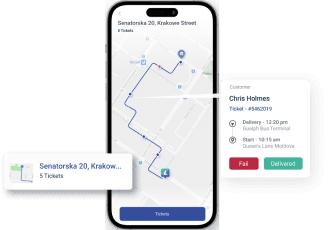TABLE OF CONTENTS

Sign-Up
Enter your email address
GPS Fleet Tracking has revolutionized fleet management, proving to be one of the most transformative tools in our technological era. For those new to this field or contemplating implementing GPS tracking, let’s break it down simply.
Imagine giant moving satellites, positioned high up in space, engaging in communication with small devices installed in your fleet vehicles. This connection enables these devices to pinpoint their precise location on Earth’s surface. But that is not all; these smart systems offer a variety of insightful reports on speed, idle time, route history, and much more.
Truly remarkable, isn’t it?
GPS Fleet Tracking, a technology that provides real-time vehicle location and essential information, consolidates all data into one central point. With this system, you gain a comprehensive understanding of your fleet’s operations at any given moment.
They say knowledge is power. And with GPS fleet tracking, this power becomes yours. It helps you to make informed decisions that improve efficiency, boost productivity, enhance safety, and significantly reduce costs.
What is GPS Fleet Tracking?
GPS Fleet Tracking is a system that utilizes GPS technology to monitor and manage the location of a fleet of vehicles, including cars, trucks, or planes. This comprehensive system involves the installation of a GPS tracking device, or tracker, in each vehicle. The tracker sends location data to a central server for analysis. Through user-friendly software interface, fleet managers can effortlessly track their vehicles’ whereabouts at all times and make informed decisions regarding routes and schedules.
Benefits of GPS Fleet Tracking
GPS Fleet Tracking offers a myriad of benefits for companies with fleets:
Centralized Visibility
GPS fleet tracking offers a centralized system that effectively manages and tracks all vehicles within a fleet. It serves as an invaluable resource for businesses, providing real-time visibility into the fleet’s activities. This control enables improved coordination and overall management.
![]()
Improved Efficiency and Productivity
Thanks to the utilization of GPS technology, managers have the capability to gather data regarding optimal routes. This helps in reducing travel times and consequently leading to fuel savings. Ultimately, this enhanced efficiency translates into cost-savings and improved productivity for the business.
Enhanced Safety and Compliance
GPS tracking systems enable the monitoring of driver behavior, including instances of speeding or hard braking. This capability promotes safer driving habits and ensures compliance with traffic laws, ultimately reducing the risk of accidents.
Cost-Savings
Companies can achieve significant fuel cost savings by optimizing routes, analyzing idle times and driver behavior. Additionally, GPS tracking systems enable more efficient maintenance planning, leading to reduced repair costs and increased vehicle life span.
Improved Customer Service
Real-time location updates enable accurate delivery time information for customers, enhancing customer service and satisfaction levels.
10 Things to Know About GPS Tracking for Your Fleet
Before deciding on a GPS tracking system for your fleet, it is beneficial to gain an understanding of the key factors within this technology.
1. Cost-Effective
Surprisingly, the cost of GPS tracking systems has decreased over time. This reduction in cost has made these systems affordable for businesses of all sizes. Additionally, these systems prove to be a wise investment by generating heavy long-term cost savings.
2. User-Friendly
Most GPS tracking systems are specifically designed with user-friendly interfaces. This means you don’t have to be a tech expert to understand how they work. Dashboards are generally easy to understand and instructions are clear, ensuring all necessary fleet information is accessible.
3. Quick Decision-Making
Real-time data plays a crucial role in GPS tracking, empowering individuals to swiftly make informed decisions when necessary. Whether it entails redirecting vehicles due to a breakdown or addressing traffic concerns, GPS tracking offers quick solutions with ease and efficiency.
4. A Helping Hand in Emergencies
In cases of theft, it helps locate and recover your vehicle at a faster pace. Law enforcement authorities can use GPS data to pinpoint the vehicle’s exact location, making recovery more efficient.
5. Efficiency Booster
GPS tracking systems capture essential vehicle data, including idle time, driving speeds, stop durations, and more. This valuable data helps fleet managers to identify inefficiencies and implement targeted improvements accordingly.
6. Track and Improve Driver Behavior
Monitoring driver behavior through systems that track speed, braking intensity, and engine idling can have a remarkable impact on fleet safety. By identifying and rectifying poor driving habits, businesses can achieve significant cost savings in fuel and maintenance expenses while nurturing a culture of safer driving.
7. Happy Customers
GPS systems enable businesses to provide accurate delivery times to their customers by constantly tracking vehicle locations. This valuable data not only enhances customer satisfaction but also fosters customer loyalty.
8. Regular Maintenance Alerts
Some GPS tracking systems are equipped with maintenance alert features. These features inform fleet managers when it’s time for regular maintenance checks, such as oil changes or tire rotations. Consistently adhering to maintenance schedules helps prevent expensive repairs in the future and ensures that your fleet stays in optimal condition.
9. Best Route Every Time
One of the key benefits of GPS systems is their ability to provide optimal routes to drivers. This feature reduces both fuel consumption and travel time, and proves particularly beneficial when a driver is unfamiliar with specific routes or when encountering traffic congestion or roadworks.
10. Data for Planning
GPS tracking systems provide valuable data that helps in future planning and decision-making. By analyzing trends and patterns, fleet managers can efficiently allocate resources and identify areas that require attention and additional training.
Best Practices for GPS Tracking in Fleet Management
Goal setting
Before incorporating a GPS tracking system, it is essential to determine your primary objectives. These objectives may range from enhancing route planning and ensuring driver safety to reducing overall costs and achieving other related benefits.
Employee Communication
To ensure your employees understand and embrace the GPS system, it is crucial to maintain open and transparent communication regarding its benefits and purpose. This fosters comprehension and acceptance among them.
Adequate Training
Ensuring the GPS system is used correctly by providing training to staff will maximize the benefits they can obtain from it.
Software Updates
Keep your GPS system up-to-date to benefit from the latest features and technology advancements.
Data Utilization
The value of a GPS system resides in the effective utilization of its collected data. It is essential to consistently review and analyze this data in order to discover opportunities for improvement and cost savings.
Conclusion
So, now you know that GPS fleet tracking offers several benefits to streamline operations and increase productivity. While implementing a new system might seem daunting, it is worth it in the end. With the right practices and a good understanding of what GPS tracking can do, this technology can bring about substantial improvements in the fleet management process.

Aiden mitchell
As a GPS Tech geek, I find Lumyri's transformative impact on GPS technology on businesses and their customers. Real-time tracking information empowers businesses to provide accurate delivery estimates, allowing customers to plan their schedules with precision.



